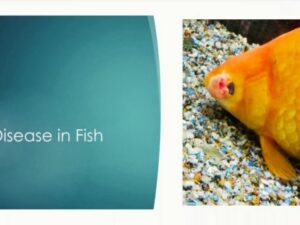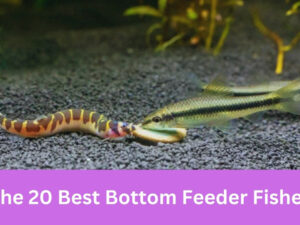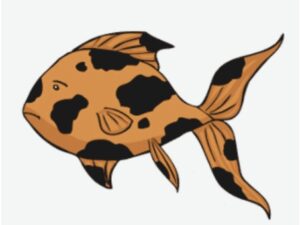Some species are more commonly known as the Panther Grouper due to their unique coloring. This fish is one of the most popular groupers in the saltwater aquarium trade, and it can be found throughout the Western Pacific Ocean.
The Panther Grouper is an uncommon sight primarily because it is so big and aggressive. It requires a tank of at least 300 gallons and should be the only Grouper in the tank. It will eat anything it can fit in its mouth, including other fish, so it is not recommended to keep this fish with anything small enough to fit into its mouth.
So, you want to learn about them? Then keep reading, because in this guide you will find all the information you need to know about these fascinating saltwater fish.
Table of Contents
- Species Summary
- Panther Grouper Care
- Tank Size
- Water Parameters
- Filtration
- Heating
- Plant Cares
- Lighting
- Fertilizers
- Co2 Systems
- Water Conditioners
- Substrate
- Decorations
- Other Tank Accessories
- Water Changes
- Cleaning The Tank
- Cleaning The Filter
- Testing The Water
- Common Possible Diseases
- Preventing Disease
- Treatment And Medications Of Diseases
- Food & Diet
- Diet Foods To Avoid
- Feeding Schedule
- Tank Mates
- Fish To Avoid:
- Advantages Of Having Panther Grouper In Your Tank
- Disadvantages Of Having Panther Grouper In Your Tank
- Wrapping Up
Species Summary
| Scientific name: | Cromileptes altivelis |
| Common name: | Panther Grouper, Highfin grouper |
| Family: | Serranidae |
| Size: | Up to 27 inches |
| Life span: | Up to 20 years |
| Habitat: | Tropical and subtropical oceans around the world |
| Behavior: | Aggressive, highly territorial |
| Tank size: | 300 gallons or larger |
| Water temperature: | 72°-78°F |
| ph Range: | 8.1-8.4 |
| Specific gravity: | 1.021-1.023 |
| Water hardness: | 8-12 dKH |
| Water Type: | Marine |
| Activity Level: | Moderately active |
| Compatibility: | solitary, not recommended for community tanks |
| Tankmates: | Only other large, aggressive fish |
| Care level: | Moderate |
| Temperament: | Aggressive |
| Diet: | Carnivorous, primarily feeds on fish and crustaceans |
The Panther Grouper, Humpback Grouper, Polkadot Grouper, Barramundi Cod, or Cromileptes altivelis is a species of marine ray-finned fish, a grouper from the subfamily Epinephelinae which is part of the family Serranidae, which also includes the anthias and sea basses. This species occurs in the tropical Western Pacific Ocean. It is sometimes placed into its genus, Plectropomus.
They have even been spotted in areas as high up north as Japan. This species is a solitary fish found at depths from 1 to 100 meters (3.3 to 328.1 ft).
The age/size of a fish will influence its price. A juvenile Panther Grouper can cost as little as $30, whereas an adult fish may be priced at over $1000.
Though they cost a lot, they live long lives. In captivity, they have been known to reach 20 years of age.
Panther Grouper Size & Growth Rate
The Panther Grouper is a large and aggressive marine fish, typically growing to about 27 inches in length.
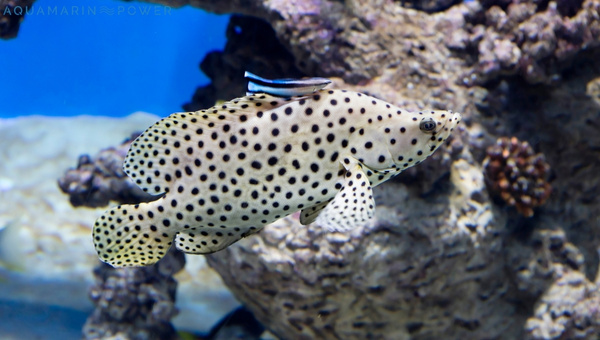
Their growth rate varies depending on their location, with those living closer to the surface growing more slowly than those from deeper water. While relatively slow-growing compared to other marine species, Panther Groupers can reach a maximum length of 27 inches.
Also Read: How To Cure Fish Fungus
Panther Grouper Lifespan
Panther Groupers are known for their long lifespans, with some individuals living as long as 20 years in captivity.
It is estimated that they may live even longer in the wild, reaching more than 40 years old. Though this species has been successfully bred in captivity, these fish still face many threats in the wild due to habitat loss, overfishing, and the live rock trade.
Panther Grouper Appearance & Coloration
Panther Groupers get their name from their unique coloration characterized by large dark spots on a light background. The spots are arranged in vertical lines running the length of the body. The number of spots and their size can vary significantly between individual fish.
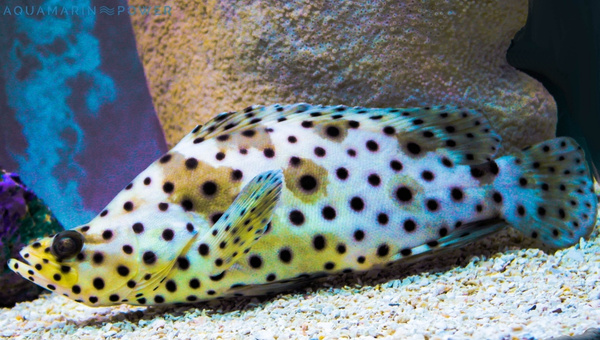
The background color of Panther Groupers can range from pale white to yellowish-brown, and the spots may be black, brown, or reddish. The fins are usually a dark color, and the tail is often edged in white.
Their body is large and laterally flattened, but their head is narrow, with a blunt snout and large eyes. On top of the head are two small spines. They have a large mouth with strong teeth, and their body is covered in large scales.
Across the entire body, Panther Groupers have a layer of mucus that helps to protect them from parasites and disease. This mucus is also thought to help the fish absorb oxygen from the water.
Males and females are difficult to distinguish based on external appearance, but the female Panther Grouper is usually larger than the male.
Also Read: 12 most types of Danios
Breeding
Breeding Panther Grouper is virtually impossible in the home aquarium, as they require specific conditions that are very difficult to replicate.
If you are interested in breeding them, it’s best to leave it to the professionals.
They are open-water egg scatterers, which would make it very difficult to incubate the eggs and raise the fry in a home aquarium.
Panther Grouper Behavior & Temperament
A newly introduced Panther Grouper can be pretty shy, and it may take a little while to get used to their new environment.
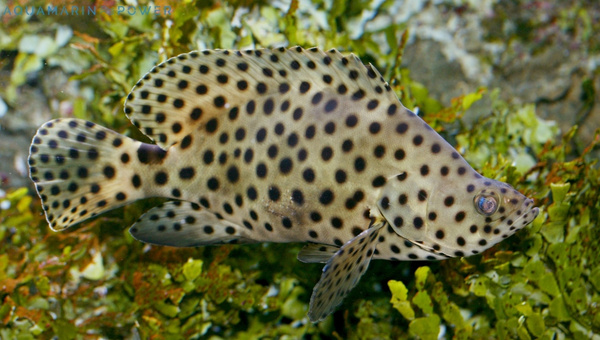
Once they have settled in, however, they are typically active fish enjoying swimming and exploring their tank.
They are also known to be quite playful, and they will often play with toys and other objects in their tank.
They are typically peaceful fish but can be aggressive towards other fish if they feel threatened.
It’s essential to provide them with plenty of hiding places and ensure they have enough space in their tank to swim and explore without feeling crowded.
Panther Grouper Care
Finding Panther Groupers for sale may be challenging, as they are not commonly traded in the aquarium trade. However, when they are available, they are typically priced between $30 and $1000, depending on their size and age.
Panther Groupers are a solitary species that do not do well in community tanks. They are very aggressive and will often attack and eat smaller fish. They should only be kept with other large, aggressive fish that can stand up to their bullying behavior.
Here are some tips for providing proper care for your Panther Grouper:
Tank Size
Due to their gigantic size, you’ll need a huge tank to keep a Panther Grouper – at least 300 gallons, preferably larger. You’ll need even more space if you want multiples of this species.
You should consider opting for another fish species if you don’t have a large tank. When setting up your tank, include plenty of hiding places and open swimming space. Panther Groupers are not shy fish and often swim out in the open.
Water Parameters
Panther Groupers are found in a wide range of habitats in the wild, from shallow reefs to deeper waters. In captivity, they should be kept in water with a temperature between 75 and 82 degrees Fahrenheit, a pH of 8.1 to 8.4, and a specific gravity of 1.020 to 1.025.
The water hardness and salinity can vary depending on their exact location in the wild, with some individuals preferring softer or saltier water. In general, however, it’s best to avoid caution and keep Panther Groupers in medium-hard or slightly brackish water.
They are not very tolerant of changes in water parameters, so it’s essential to keep a close eye on your levels and make gradual changes if necessary.
Filtration
When choosing a filter for your Panther Grouper tank, get one that is appropriate for the size of your tank and the water volume you’re working with. A good rule of thumb is to choose a filter that can turn over the entire volume of your tank at least four times per hour.
Panther Groupers are not very sensitive to water quality changes, but they produce a lot of waste, so a good filter is essential.
Some recommended filters for Panther Grouper tanks include:
- The Fluval FX6: These external canister filters are some of the best on the market, and they’re more than capable of handling the waste produced by a Panther Grouper.
- The Eheim 2217: This is another excellent external canister filter that will greatly filter your Panther Grouper tank.
- The AquaClear 110: This is a good option if you’re looking for an internal filter, as it’s designed for larger tanks.
Heating
Panther Groupers are a tropical species, so they need a heater to maintain their ideal water temperature. If the temperature in your tank drops below 75 degrees Fahrenheit for any reason, you should check on your heater and make sure it is working correctly.
Also, be sure to place your heater in an area where it will not get wet, as this could cause it to malfunction.
A good rule of thumb is to choose a heater that will raise the temperature in your tank by about 10 degrees Fahrenheit.
Some recommended heaters for Panther Grouper tanks include:
- The Fluval Eheim Jager: This is a good option for their tanks, as it can raise the temperature by up to 25 degrees Fahrenheit.
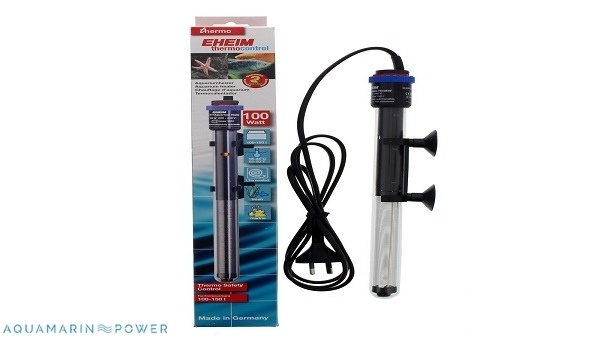
- The Finnex HMA-500S: This powerful heater is ideal for their tanks, and because it’s submersible, you don’t have to worry about it getting wet.
- The Hydor ETH 200: This is another good submersible heater used in Panther Grouper tanks.
Plant Cares
Panther Groupers usually leave live plants alone in the tank, but they will sometimes eat them if something else is not readily available to eat. If you’re planning to keep live plants in your Panther Grouper tank, choosing hardier varieties that are less likely to be eaten is good.
Some good options for Panther Grouper tanks include:
- Anubias: This hardy plant grows well even in lower light levels, making it ideal for Panther Grouper tanks.
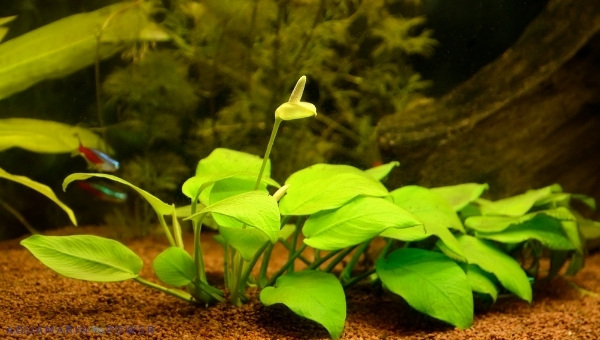
- Java fern: Java fern can also be grown in low-light conditions, so it’s another good option for Panther Grouper tanks.
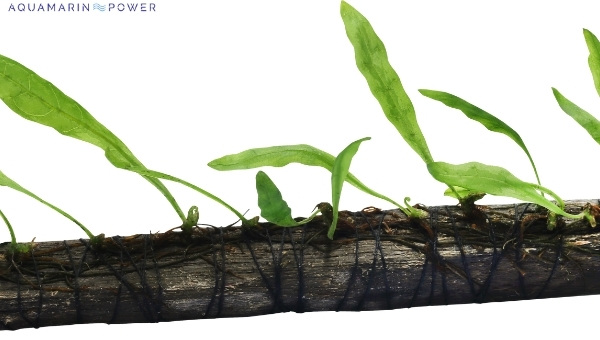
- Bolbitis: This plant is a little more delicate than the others on this list, but it’s still a good choice for Panther Grouper tanks.
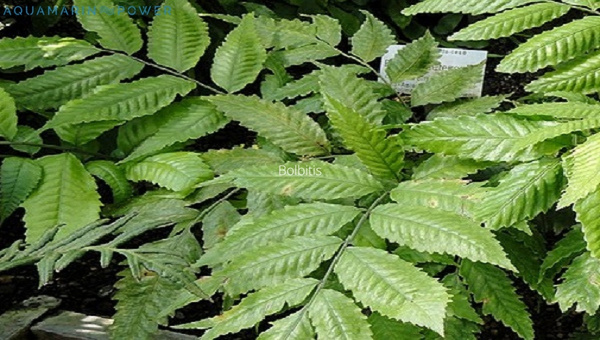
Lighting
Panther Groupers don’t require much light, so you can usually use a fairly basic lighting system.
If you want to add live plants to your Panther Grouper tank, it’s generally recommended that you choose lights that are in the 10-20-watt range.
Some good options include:
- The Finnex Fugeray Planted+: This is an excellent all-around light that can be used for Panther Grouper tanks.
- The Beamswork DA 6500K: This is another good option for Panther Grouper tanks, as it provides plenty of light without being too intense.
- The AquaIllumination AI Prime 16HD: This is a more expensive option, but it’s one of the best lights on the market and perfect for Panther Grouper tanks.
Fertilizers
If you’re planning to keep live plants in your Panther Grouper tank, you will need to use fertilizers to ensure they have everything to grow.
Many different types of fertilizers are available; it can be unclear to determine which ones you need.
A good rule of thumb is to choose a fertilizer containing all essential nutrients (nitrogen, phosphorus, and potassium) in equal amounts.
Some good options include:
- The Seachem Flourish: This is an excellent fertilizer for Panther Grouper tanks, as it contains all essential nutrients in balanced amounts.
- The API Leaf Zone: This fertilizer is specially formulated to encourage leaf growth, making it ideal for Panther Grouper tanks.
- The Aqua Design Amano ADA Power Sand: This is a good option for Panther Grouper tanks, as it contains all essential nutrients in balanced amounts.
Co2 Systems
If you’re planning to keep live plants in your Panther Grouper tank, you will need to use a Co2 system to provide them with the carbon dioxide required to grow.
There are many different Co2 systems available, and it cannot be very clear to figure out which one you need.
A good rule of thumb is to choose a system compatible with your tank size.
Some good options include:
- The AquaVista AV500: This is a good option for Panther Grouper tanks, as it’s compatible with tanks up to 50 gallons.
- The Fluval Pressurized CO2 kit: This is a good option for Panther Grouper tanks, as it’s compatible with tanks up to 100 gallons.
- The Tom Aquatics EasyCarbo: This is a good option for Panther Grouper tanks, as it’s compatible with tanks up to 200 gallons.
Water Conditioners
Panther Groupers are very sensitive to water conditions, so it’s essential to use water conditioners to ensure the water in their tank is safe.
There are many different types of water conditioners available, and it can be confusing to figure out which one you need.
A good rule of thumb is to choose a water conditioner that removes chlorine and chloramine from the water.
Some good options include:
- The API Tap Water Conditioner: This is a good option for Panther Grouper tanks, as it removes chlorine and chloramine from the water.
- The Seachem Prime: This is a good option for Panther Grouper tanks.
- The Tetra AquaSafe Plus Water Conditioner: This is also a good option for Panther Grouper tanks.
Substrate
Panther Groupers are native to the reefs of the Western Pacific Ocean, so they are used to living on a substrate made up of sand and coral.
Many different types of substrates are available, and it can be challenging to figure out which one you need.
A good rule of thumb is choosing a fine and smooth substrate, which will help prevent algae growth.
Some good options include:
- The CaribSea Super Naturals Aragonite Sand
- The Fluval Sea Reef Sand
- The Oceanic Reef Sand
Decorations
Panther Groupers are native to the reefs of the Western Pacific Ocean, so they are used to living in a tank decorated with live rocks and corals.
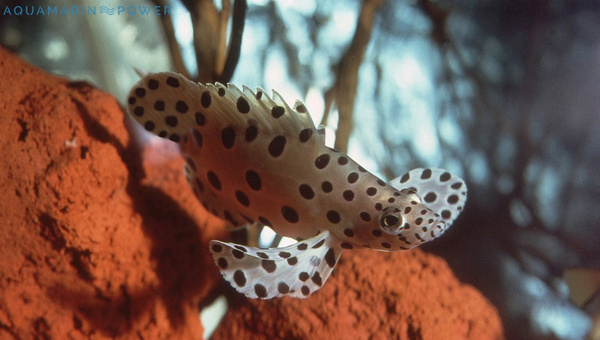
There are many different types of decorations available, and it can be confusing to determine which ones you need.
A good rule of thumb is to choose decorations made from natural materials, as these will help create a more realistic environment for your Panther Grouper.
Some good options include:
- The Deep Blue Sea Dragon Rock
- The Premium Aquariums Live Rock
- The CaribSea Eco-Complete Live Rock Alternatives
Other Tank Accessories
You will need to have a few other things in your Panther Grouper tank to keep it running smoothly.
Some good options include:
- Aquarium Thermometer: This will help you monitor the temperature in your tank and ensure that it’s safe for your Panther Grouper.
- Air Pump: This will help to keep the water in your tank moving and aerated.
- Water Test Kit: This will help you monitor your water’s quality and ensure it’s safe for your Panther Grouper.
- Algae Scraper: This will help you to maintain the tank by keeping it clear of any algae growth.
Water Changes
Water changes are essential for keeping your Panther Grouper tank clean and safe.
A good rule of thumb is to do a water change once a week and to remove 10-15% of the water from the tank.
Vacating the gravel during each water change is also suitable for removing any built-up debris.
Panther Groupers are beautiful and unique fish that add to any aquarium. They can thrive in captivity for many years with little care. By following the tips in this guide, you can be sure that your Panther Grouper will have everything it needs to stay healthy and happy.
Cleaning The Tank
Cleaning the tank is essential to taking care of your Panther Grouper. There are a few different methods that you can use to clean your tank, and it’s necessary to find one that works well for you.
One popular method is to use a gravel vacuum to remove any built-up debris from the tank.
You can also use a specialized aquarium cleaner to ensure the tank is completely clean and free of algae growth.
Whatever method you choose, it’s essential to do regular cleaning to keep your Panther Grouper happy and healthy.
Cleaning The Filter
Cleaning the filter is essential to taking care of your Panther Grouper. There are a few different methods that you can use to clean your filter, and it’s essential to find one that works well for you.
To clean the filter cartridge, remove it from the tank and rinse it thoroughly in fresh water.
You may also want to soak the filter in a mild cleaning solution such as white vinegar or hydrogen peroxide, which can help kill off any bacteria growing on it.
Any other parts of your filter will need to be cleaned regularly, and it’s essential to follow the manufacturer’s instructions to avoid damaging the filter.
Testing The Water
Testing the water is important to taking care of your Panther Grouper. There are a few different tests that you can use to test the water, and it’s important to find one that works well for you.
One popular method is to use a water test kit, which will help you monitor the quality of your water and ensure that it’s safe for your Panther Grouper.
You can also use an online water testing service, which will send you a kit that you can use to test the water in your tank.
Whatever method you choose, it’s essential to do regular testing to keep your Panther Grouper happy and healthy.
Common Possible Diseases
There are a few common diseases that can affect Panther Groupers, including
- Dropsy: This bacterial infection causes swelling in the body and loss of appetite. Treatment typically involves using an antibiotic medication to help kill off any bacteria in the body.
- Metritis: This is a bacterial infection that affects the reproductive system and causes inflammation in the uterus. Treatment typically involves using an antibiotic medication to help kill off any bacteria in the body.
If you notice any of these symptoms in your Panther Grouper, it’s essential to take them to a veterinarian as soon as possible for treatment.
Preventing Disease
The best way to prevent disease is to keep your Panther Grouper healthy and happy. This can be done by providing them with a clean and safe environment and ensuring they get the proper nutrition.
It’s also important to quarantine any new fish before adding them to your tank and to keep an eye out for any early signs of disease so that treatment can be started as soon as possible if needed.
It’s essential to take good care of them and provide them with everything they need. By following the tips in this guide, you can be sure that your fish will stay healthy for many years.
Treatment And Medications Of Diseases
If you think your Panther Grouper may be sick, it’s essential to take them to a veterinarian as soon as possible for treatment.
A few different medications can be used to treat common diseases in them, and your veterinarian will be able to prescribe the best one for your fish.
Some common medications include:
- Antibiotics: These are used to treat bacterial infections and can be administered through food or water.
- Metronidazole: This is an anti-inflammatory medication that is used to treat metritis. It can be given orally or by injection.
Your veterinarian will be able to prescribe the best medication for your fish, and it’s important to follow their instructions to give your Panther Grouper the best chance of recovery.
Food & Diet
A large fish like this can eat a wide variety of foods, including
- Live food: This includes worms, shrimp, and other small fish.
- Frozen food: This can include krill, plankton, and other types of frozen seafood appropriate for your Panther Grouper.
- Dry food: There are a variety of dry foods available for large fish, and you can find ones designed explicitly for Panther Groupers.
It’s essential to provide your fish with a variety of different foods so that they can get all the nutrients they need, and it’s also necessary to feed them several times a day, so they have enough to eat.
As the fish grow, they will get better at hunting for food, but it’s still essential to provide them with a variety of different options so that they can get the nutrition they need.
Diet Foods To Avoid
There are a few types of food that you should avoid feeding your Panther Grouper, including
- Processed foods: These can contain harmful chemicals and preservatives that can be dangerous for your fish.
- Foods high in fat: This can cause obesity and other health problems in your Panther Grouper.
It’s important to read the labels on all the food you buy and avoid anything containing harmful chemicals or preservatives.
You should also avoid feeding your fish anything high in fat, which can lead to health problems.
Feeding Schedule
Panther Groupers should be fed multiple times a day, and it’s important to provide them with a variety of different foods so that they can get all the nutrients they need.
As the fish grow, they will get better at hunting for food, but it’s still important to provide them with a variety of different options so that they can get the nutrition they need.
A good feeding schedule for them is as follows:
- Morning: Feed them a small amount of live food or frozen food.
- Noon: Feed them a small amount of dry food.
- Evening: Feed them a small amount of live food or frozen food.
It’s important to keep an eye on your fish to ensure they are eating and behaving normally, and you should adjust the feeding schedule if needed.
Tank Mates
Panther Groupers are typically peaceful fish but can be aggressive towards other fish if they feel threatened.
They should be housed with other large fish similar in size and temperament.
Some good tank mates for them include:
- Tiger Fish: These fish are similar in size and temperament to Panther Groupers and can be a good choice for a tank mate.
- Tuna: These fish are large and active and can keep up with the activity level of your Panther Grouper.
- Moray Eel: These fish are large and can be aggressive, but they typically leave Panther Groupers alone.
- Sea Bass: These fish are similar in size and temperament and make good tank mates.
- Grouper: These fish are also similar in size and temperament, making good tank mates.
You should avoid housing them with smaller or more timid fish, as they may become stressed and may not be able to compete for food.
It’s also important to avoid housing your Panther Grouper with fish that have long, flowing fins or delicate scales, as these can be easy targets for a predatory fish like this one.
Fish To Avoid:
- Clownfish: These fish are small and timid, and your Panther Grouper will likely bully them.
- Angelfish: These fish have long, flowing fins that a Panther Grouper can easily damage.
- Butterflyfish: These fish have delicate scales that a Panther Grouper can easily damage.
Advantages Of Having Panther Grouper In Your Tank
Panther Groupers are a great addition to your tank for a few reasons.
First, they are active fish enjoying swimming and exploring their tank. This can make your tank more interesting to watch, as they will often swim in groups and interact.
Second, they are known to be quite playful and often play with toys and other objects in their tank. This can enrich your fish and help keep them from getting bored.
Finally, Panther Groupers are typically peaceful fish but can be aggressive towards other fish if they feel threatened. This can be advantageous if you have smaller or more timid fish in your tank, as it will discourage them from picking on the other fish.
Disadvantages Of Having Panther Grouper In Your Tank
While there are some advantages to keeping Panther Groupers in your tank, there are also some potential drawbacks. First, they can be quite aggressive towards other fish if they feel threatened, so it’s essential to provide them with plenty of space and hiding places to avoid this.
Second, these fish require a large tank with excellent filtration, as they can produce a lot of waste and tend to be messy eaters. If you do not have an appropriately sized tank or good filtration, keeping Panther Groupers in your tank may result in frequent maintenance and water quality issues.
Wrapping Up
As you can see, there are advantages and disadvantages to keeping Panther Groupers in your tank. If you have a large enough tank, good filtration, and are comfortable with the potential for aggression, these fish may be a great addition to your aquarium. However, if you do not think you can meet their needs, then it’s best to choose another fish.
Do you have experience keeping them in your aquarium? Let us know in the comments below!

